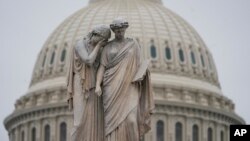U.S. immigration courts are among the bureaucratic casualties of the country's partial government shutdown, now in its second week.
The U.S. Department of Justice, which oversees the immigration court system, announced last week that cases for immigrants who are detained will continue; those who are not detained will be "reset for a later date after funding resumes."
With a backlog of 809,041 cases this fiscal year, court dates being scheduled years away even before the shutdown, and an average wait time that has been steadily increasing to an average of 718 days, according to federal data, the ongoing battle between U.S. President Donald Trump and members of Congress over funding is leading to upheaval in a system already taxed by more cases than it can handle in a timely way.
Trump's desire for one immigration-related policy -- Congressional approval of funding for additional barriers along the southern U.S. border -- stalled negotiations on federal spending; the effects are rippling into other immigration issues and services.
The Board of Immigration Appeals (BIA) under the U.S. Department of Justice
BIA "is processing emergency stay requests as well as cases where the alien is detained, including appeals, motions, and federal court remands."
US Citizenship and Immigration Services
Because much of USCIS's work is fee-funded, the agency is up and running, and telling all individuals to attend their scheduled interviews and appointments. The agency is also still processing applications, with a few exceptions. More information on the affected programs is available on their website. Some programs will be affected, including:
EB-5 Immigrant Investor Regional Center Program (not the EB-5 Program).
E-Verify: The free internet-based system allows businesses to determine the eligibility of their employees to work in the U.S.
Conrad 30 Waiver Program for J-1 medical doctors.
Non-minister religious workers.
US State Department
Consular services - including visa processing abroad - "will remain operational as long as there are sufficient fees to support operations," according to State Department guidance. But those services may become more limited over time if Washington cannot hammer out a deal to end the partial government shutdown.





